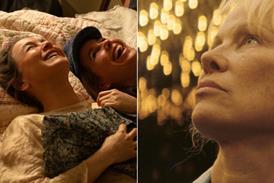The European Union’s MEDIA Programme should be opened up to cultural goals and promote ‘film literacy’ in the support programme’s next generation from 2014, according to recommendations made during the European Culture Congress in the Polish city of Wroclaw at the weekend.
The proposals were aired by Gabriella Goenczy, a member of the strategy group for A Soul For Europe civil society initiative, during a panel discussion with film director Istvan Szabo, MEP Doris Pack and Jan Truszczynski, Director-General for Education and Culture at the European Commission, on the impact of the European Union cultural programmes and their future shape.
In a keynote speech, Goenczy argued that “MEDIA should not only be a funding instrument for the film industry, but also promote European integration and European image communication.”
“In future, the MEDIA Programme should select not only films that were made in Europe, but also films that promote knowledge and awareness of Europe and ‘Europeanness’, films that foster dialogue in Europe and address Europe’s attractiveness and its difficulties,” she said, noting that the “encouraging success” of the European Parliament’s LUX Film Prize showed that “using the medium of film to convey Europe is a sustainable, future-oriented project.”
Moreover, the strategy group recommended that a post-2013 MEDIA Programme should promote the inclusion of film, like literature, in school curricula to teach children about the grammar of the moving image as they are taught about the grammar of the written word. “We recommend not only to promote ‘film literacy’, but also ‘European competence’ through film,” Goenczy said. “European identity and intercultural communication skills should become core elements of media literacy.”
Connected with this, she proposed that European Film Weeks should be established at schools across Europe and that “disseminating ‘images’ of Europe should be the focus of European communication policy.”
In addition, the A Soul For Europe initiative gave its support to the demands for a future MEDIA Programme – as set out by a group of European film industry bodies in the early summer, including European Distribution, European Producers Club and FIAPF – to ensure that “MEDIA should retain its operational and budgetary independence.”
The recommendations about MEDIA’s suggested future role in the promotion of media literacy had already been acknowledged in Brussels before the Wroclaw conference since the European Commission’s Directorate-General for Education and Culture is in preparations to commission a study on film literacy in Europe.
In its open call for tenders, the Commission explained that “film literacy is meant to provide, notably to young European audiences, better awareness and knowledge about our film heritage and increasing interest in these films and in recent European films, the ultimate goal being to build a long term audience for European films.”
It said that it was “currently reflecting on how to include support for media and film related educational activities into the future MEDIA Programme. In particular those for young audiences (organised e.g. by festivals, broadcasters, distributors, cinemas, etc.) aiming at increasing awareness and curiosity and ultimately at creating long term audience for European films on all platforms.”
Parallel to the European Culture Congress, Europe’s Ministers of Culture and Audiovisual Policy gathered in Wroclaw for an informal meeting also attended by European Commissioners Androulla Vassiliou (Culture) and Michel Barnier (Internal Market and Services).
Barnier drew attention to the need for an appropriate copyright framework for the digital era and asked for responses to the recently launched Green Paper on the online distribution of audiovisual works, while Vassiliou outlined the Commission’s plans for the new Creative Europe funding umbrella for 2014-2020 and spoke about the preservation of Europe’s cultural heritage.
“New digital technologies facilitate not only the preservation of books, films, pictures, photographs and music, but can also make them easily and instantly accessible,” Vassiliou said.






















No comments yet